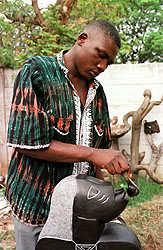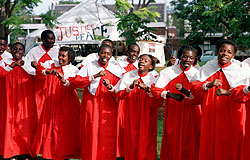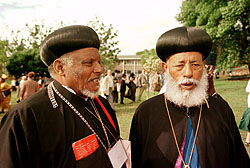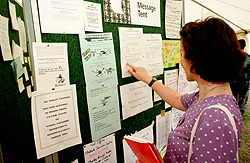The striking graphic designs of world-renowned Zimbabwean artist Chaz Maviyane-Davies contributed to the distinctively African flavour of the eighth assembly. His drawing of a Shona stone sculpture -- which was later carved into an actual sculpture by Zimbabwean artist Wilbert Samapundo and presented to the WCC by the churches of the host country -- became the assembly's logo; and his stunning backdrops in the plenary hall enlivened the atmosphere during sometimes tedious business sessions.
Greetings
Pope John Paul II and South Korea's President Kim Dae-Jung were among the dignitaries who sent
greetings to the eighth assembly. Kim Dae-Jung wrote: "On the occasion of this WCC assembly, I
make special note of the fact that the Council has stood with the churches, intellectuals, students and
other people of Korea during their long struggle to achieve democracy and reunification..."
Many faiths
To encourage interfaith dialogue, guests of other faiths were invited to Harare to observe the World
Council of Churches in action. Among them were several Buddhists and Jewish rabbis, a Sikh, a
Hindu, a Muslim and a representative of African Traditional Religions.

Wilbert Samapundo working on
Photo by Chris Black/WCC
the Shona stone sculpture
which became the assembly logo
Click on the photo to order (ref. 7067-13a)



